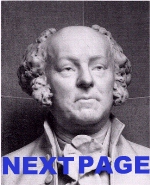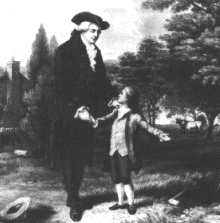| It’s already a cliché to
say, “Everything changed on September 11th.” Our thinking about heroes
did, however, undergo a major shift on that fateful day.
The late 20th century was not a good time for heroes. We seemed
more interested in debunking old heroes than finding new ones. A
great man like Thomas Jefferson could scarcely be mentioned before someone
would say, “Yes, but what about his relationship with those slaves of his?”
People seemed more interested in JFK's affair with Marilyn Monroe than
with his presidency.

Still a hero after Sally Hemmings?
|
AMERICA'S CHANGING VIEWS
OF HEROES
Rather than exposing clay feet, we once tried to make our heroes
appear even more heroic. As if George Washington’s real life weren’t
heroic enough, Parson Weems felt compelled to add stories that magnified
Washington’s virtues---including his well-known story about young George
cutting down a cherry tree and then not lying about it. It wasn’t
enough that Davie Crockett exhibited bravery as an adult—he had to “shoot
a bear when he was only three.”

|

Young George (in Parson's Weems fictional account)
tells his father, "I cannot tell a lie--I cut down the cherry tree."
Let us hope we do not begin again retouching imperfect heroes—but
let us also be thankful that our era of debunking heroes might have come
to an end on September 11th. When Rudolph Giuliani is mentioned today,
no one pipes up with a complaint about his extramarital affair. No
journalist, to my knowledge, has produced a story exposing the prior cocaine
use of any of the hero passengers aboard United Flight 93 that crashed
in Pennsylvania.
When we honor heroes, we honor their heroic qualities. Heroes
are not perfect. |